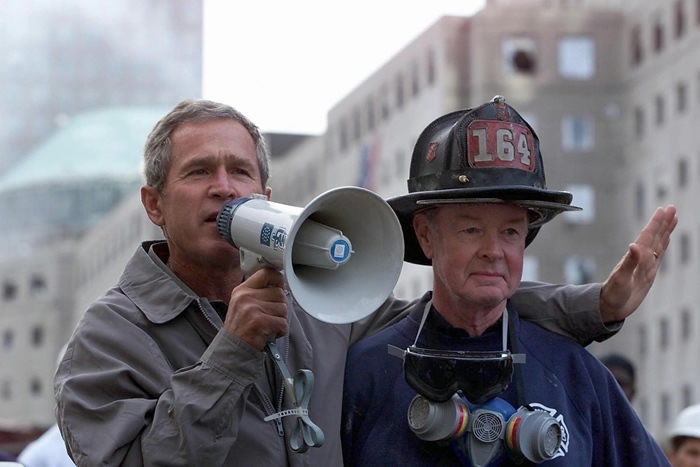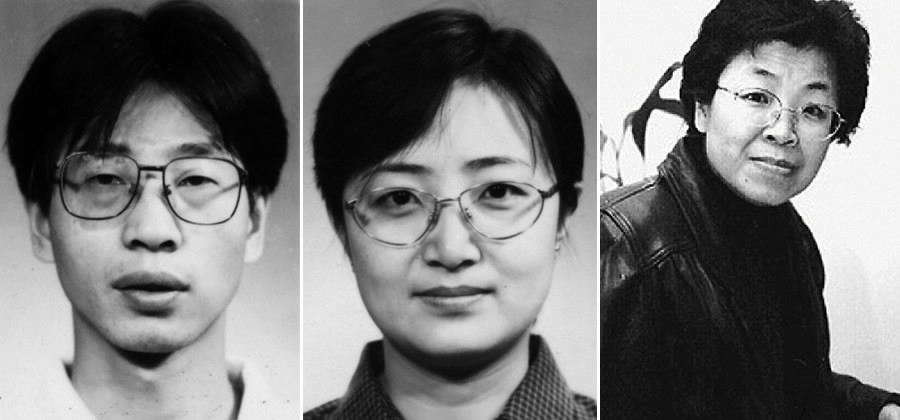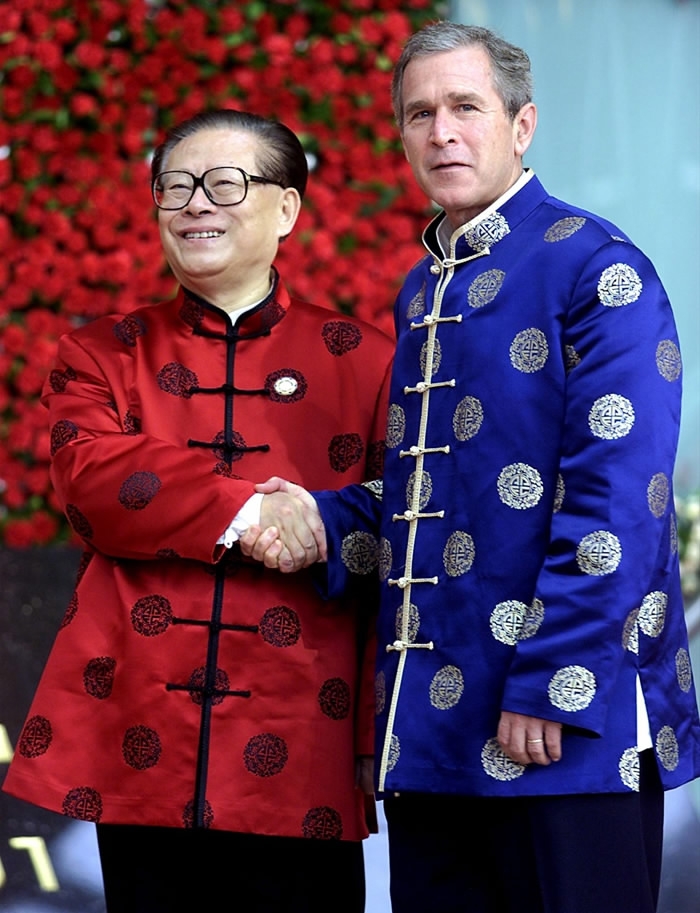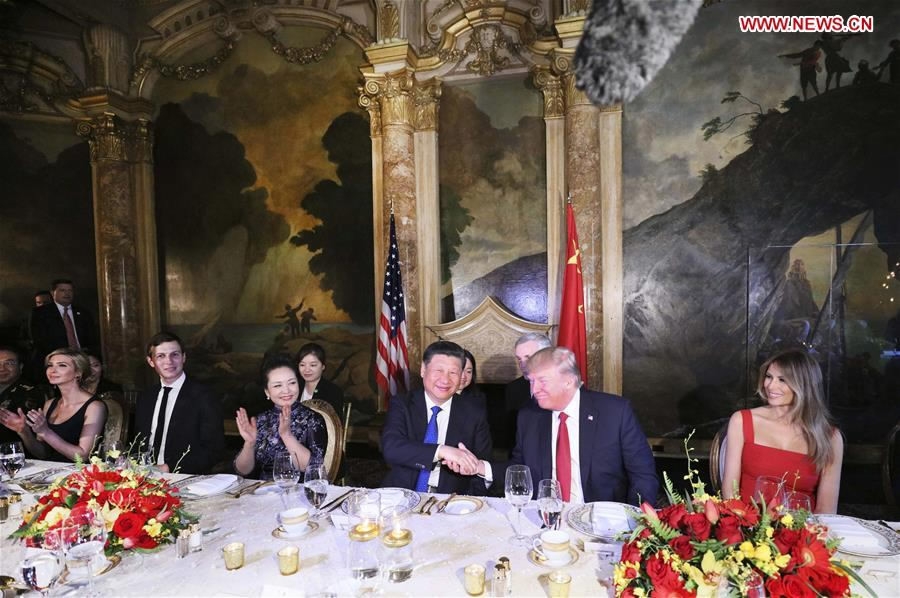In the first seven months of Donald Trump's presidency, China and the United States have worked closely on a range of issues including trade, the war in Syria and the current crisis on the Korean Peninsula. Despite not agreeing on everything, the two countries have been able to manage their differences.
After Chinese President Xi Jinping's "
positive and fruitful" summit with Trump in Florida in April, Trump is scheduled to visit China later this year. The two heads of state, having established a sound working relationship and a personal friendship, also frequently exchange views through telephone calls, messages and envoys.

Then US President George W. Bush (L), standing next to retired firefighter Bob Beckwith, speaks to volunteers and firemen as he surveys the damage at the site of the World Trade Center in New York, September 14, 2001. /AFP Photo
Then US President George W. Bush (L), standing next to retired firefighter Bob Beckwith, speaks to volunteers and firemen as he surveys the damage at the site of the World Trade Center in New York, September 14, 2001. /AFP Photo
This was not the case 16 years ago during George W. Bush's initial months, with several successive points of friction between Beijing and Washington. After the NATO bombing of the Chinese embassy in Belgrade in May 1999, the collision of Chinese and American warplanes over the South China Sea in April 2001 and Bush's decision to increase arms sales to Taiwan, bilateral relations were difficult at the turn of the century.
In fact, tension between the two countries were so high that many Chinese were happy to learn of the news that the US was attacked on
September 11, 2001. Ten years later, a survey by Chinese internet portal Tencent showed that nearly 60 percent of respondents admitted they had gloated over 9/11.

Three Chinese journalists were killed during the NATO bombing of the Chinese embassy in Belgrade in May 1999. /Xinhua Photo
Three Chinese journalists were killed during the NATO bombing of the Chinese embassy in Belgrade in May 1999. /Xinhua Photo
Paradoxically, China-US relationship quickly began to improve after the attacks, partly because the US shifted its strategic focus to the War on Terror and partly because the two permanent members of the United Nations Security Council needed to coordinate their stances more frequently on regional and global issues.
Dramatic turning point
A Washington Post article in June 2001, citing officials and analysts from both China and the US, expressed concern that “shifts in attitudes in both nations seem to be pointing to a showdown.”
The seemingly imminent "showdown" did not happen, as the Bush administration's "entire world view" was changed by the September 11 attacks, Chinese affairs expert Frank Ching wrote in a commentary in The Diplomat in May 2011.
The Bush administration redirected its attention to fighting terrorism worldwide, no longer considering China as its major enemy, Ching said, calling the event a "dramatic turning point" in China-US ties.

Smoke billows up after the first of the World Trade towers collapses in New York, September 11, 2001. /AFP Photo
Smoke billows up after the first of the World Trade towers collapses in New York, September 11, 2001. /AFP Photo
Shortly after 9/11, then Chinese President Jiang Zemin condemned "all violent activities by terrorism" and had a phone conversation with Bush. China supported UN Security Council resolutions that condemned the attacks and intensified communication and coordination with the US after the start of the Afghanistan war. China also pledged that it would not allow al-Qaida leader Osama bin Laden and his followers to enter the country.
The US expressed its appreciation for China's support. During the APEC summit in Shanghai in October 2001, Bush thanked Jiang for China's help on America's anti-terror efforts. On another visit to China in February 2002, Bush said America welcomed the emergence of a strong, peaceful and prosperous China. In the fight against terror, the Bush administration designated China's "East Turkestan Islamic Movement" as a terrorist organization in August 2002.

Then Chinese President Jiang Zemin (L) greets then US President George W. Bush prior to a meeting of the Asia Pacific Economic Cooperation (APEC) leaders in Shanghai, October 21, 2001. /AFP Photo
Then Chinese President Jiang Zemin (L) greets then US President George W. Bush prior to a meeting of the Asia Pacific Economic Cooperation (APEC) leaders in Shanghai, October 21, 2001. /AFP Photo
More common interests than differences
Despite differences and disputes from time to time, China and the US have maintained mostly healthy relations since 9/11, witnessing frequent visits between their political leaders, intensified coordination on world issues like Iraq, the DPRK and climate change, and expanded trade. This trend has led to unprecedented levels of strategic trust and common interests between them.
In 2016, China-US trade volume reached 524.3 billion US dollars, with American exports to China up 500 percent from 2001.
Xi and Trump both believe the two countries "
can absolutely be very good partners," the Chinese president told US Secretary of State Rex Tillerson during their meeting in Beijing in March, adding that cooperation is "the only right choice" for China and the US, which share "far more common interests than differences."

Chinese President Xi Jinping (R3) and his wife Peng Liyuan attend a welcome banquet hosted by US President Donald Trump (R2) and First Lady Melania Trump at the Mar-a-Lago resort in Florida, US, April 6, 2017. /Xinhua Photo
Chinese President Xi Jinping (R3) and his wife Peng Liyuan attend a welcome banquet hosted by US President Donald Trump (R2) and First Lady Melania Trump at the Mar-a-Lago resort in Florida, US, April 6, 2017. /Xinhua Photo
If there were positive unintended consequences of 9/11, the prevention of a potential China-US showdown was among them. It reminded the two major countries that there were bigger and common challenges in the world that needed to be addressed with their joint efforts, and that by working together, they could deepen mutual trust, expand common interests and achieve win-win results.
The escalation of DPRK's nuclear crisis is the latest test for China and the US, which have clear disagreements on how to denuclearize the Korean Peninsula. To avoid a repeat of the dangerous confrontation in the months before 9/11, the two countries need to stay positive and stay focused on what they have in common.







